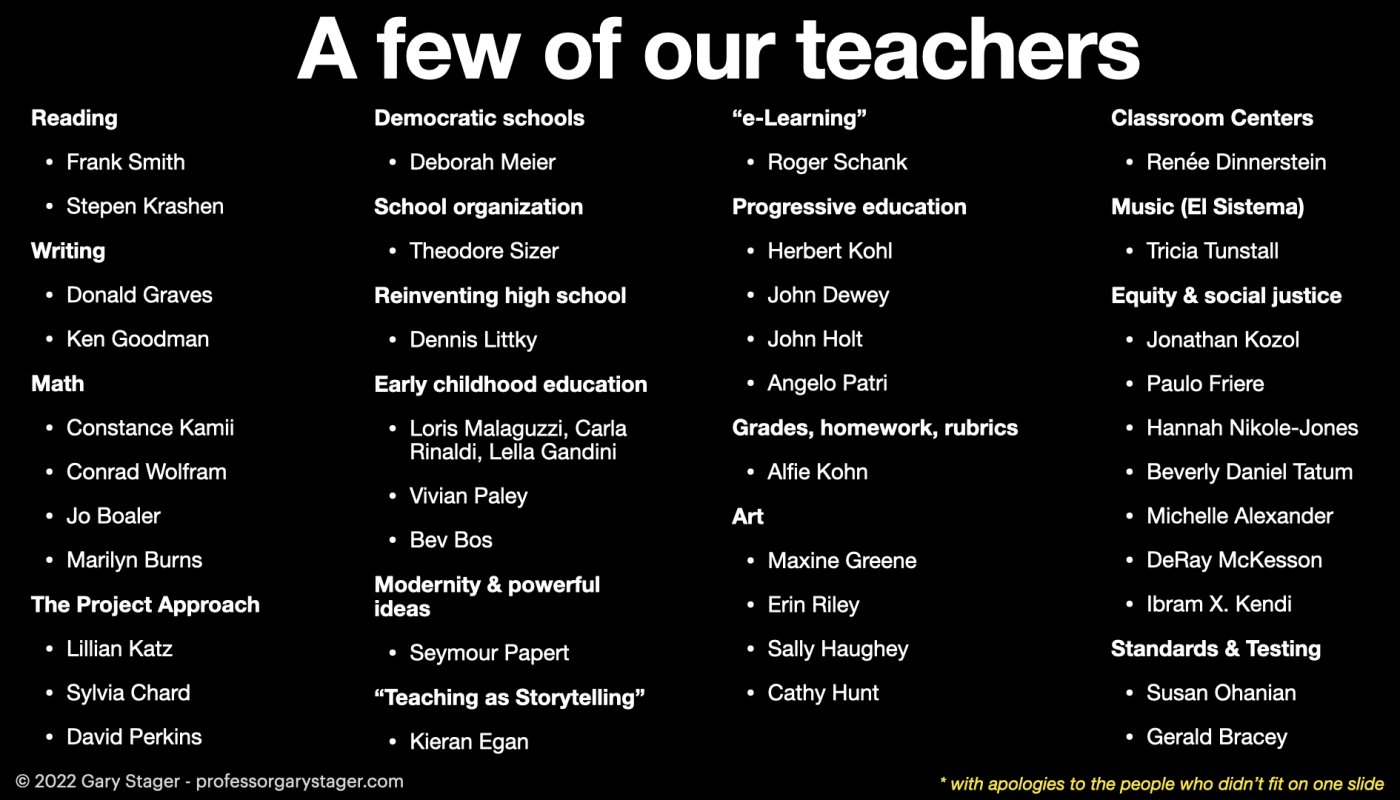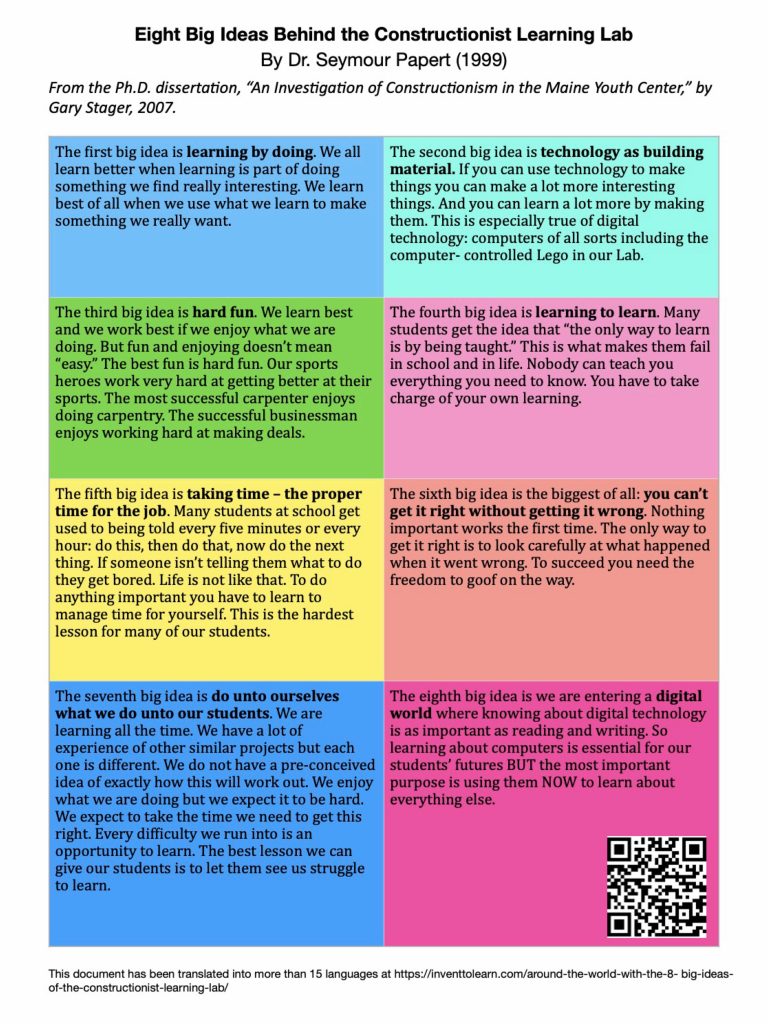The following is a non-exhaustive collection of resources intended to inform educators interested in open education, open plan classrooms, and other forms of learner-centered environments. It only recommends resources found on the Internet. You should of course read John Holt, Loris Malaguzzi, Herb Kohl, A.S. Neill, Lillian Weber, Jonathan Kozol, Paulo Friere, David Perkins, David Hawkins, James Herndon, John Dewey and many others… Consider this an incomplete introduction to open (and progressive) education.
Download the free eBook anthology curated by Gary Stager, Dreams of Progressive Education. This eBook assembles seminal books and articles to help guide progressive educators on their journey.
There is a bibliography at the end of this page. Click here to jump to that bibliography.
Vintage Videos from the 1970s
A documentary on open education and open plan schools.
A Southern United States community commits to open education in an old public primary school.
This video blows my mind.
Herbert Kohl, a pioneer of open education featured in this documentary on the early days of whole language and open education.
Getting Started?
Getting started reading about progressive education? Try this handy shortlist of recommended books Gary Stager assembled for teachers.
A Seminal Book
The Open Classroom by Herbert Kohl
This short book launched the open education movement in the United States
But how do they learn to read?
- Reading by Frank Smith
- A seminal text on natural approaches to literacy (free PDF). Frank Smith’s books, Reading F.A.Q. and Unspeakable Acts, Unnatural Practices: Flaws and Fallacies in Scientific Reading Instruction, are indispensable tools in the “science of reading” era.
How to “do it”
Making Learning Whole by David Perkins is a great practical book for helping teachers think about teaching in a project approach.
Classroom organization
Although written for early childhood, Choice Time: How to Deepen Learning Through Inquiry and Play, does a terrific time of helping educators at any level think about classroom centers and student autonomy.
Space design
Prakash Nair is one of the world’s finest progressive school designers and architects. Learning by Design: Live Play Engage Create, as well as his new more specialized books are highly recommended.
So, you want to reinvent secondary education…
- The Big Picture: Education Is Everyone’s Business by Dennis Littky and Samantha Grabelle
- Ted Sizer’s trilogy: Horace’s Compromise, Horace’s School, Horace’s Hope
- Coalition of Essential Schools’ Ten Common Principles
Democratic learner-centered schooling
Deborah Meier’s book, In Schools We Trust: Creating Communities of Learning in an era of Testing and Standardization, is a must-read.
This isn’t new!
Angela Patri’s book, A Schoolmaster of the Great City, remains a clear-eyed and practical plan for the future of education. It was first published in 1917.
Seymour Papert’s Eight Big Ideas Behind Constructionism
David Hawking’s Messing About with Science
Computer As Material: Messing About with Time by Seymour Papert & George Franz
Constance Kamii Videos
Multiplication of Two-digit Numbers
Making Change – The difficulty of constructing “tens” solidly
Constance Kamii Direct vs Indirect Ways of Teaching Number Concepts at Ages 4-6
A comprehensive lecture explaining Piagetian ideas showing that although number concepts cannot be taught directly, they can be taught indirectly by encouraging children to think.
Kamii Games for Developing Number Sense
- Arithmetic Games with Playing Cards
- Modifying a Board Game (Sorry) to Foster Kindergartners’ Logico-Mathematical Thinking
- Kamii Arithmetic for First Graders Lacking Number Concepts
- Multiplication Games: How We Made and Used Them
- Lining-Up the 5s – A Card Game
- Kamii on Games over Worksheets (article)
- Kamii Game Cards to download and print (link has gone dead – trying to find backup)
- Selected Standards from the Common Core State Standards for Mathematics, Grades K-3, and My Reasons for Not Supporting Them (A 2015 white paper by Constance Kamii)
- Playing with Numbers – Constance Kamii and Reinventing Arithmetic in Early Childhood Education
Constance Kamii and Lillian Katz “Defending the Early Years” panel
Other FABULOUS Inspirational Videos with Implications for Open Education
I remember seeing this live when it aired in 1991. There is rarely any coverage of education this sensible on television.
The late Bev Bos – “Starting at Square One”
A brief bibliography of Open Education Texts
Links are to Amazon, or in the case of articles to the article itself. Online reading links are at the end of many citations.
(These will be alphabetized shortly.)
- Alexander, R. (2010). Children, their World, their Education: Final Report and Recommendations of the Cambridge Primary Review. Routledge. [Read/Download summary report]
- Dewey, J. (1916). Democracy and Education: An Introduction to the Philosophy of Education. Free Press.
- Freire, P. (2000). Pedagogy of the Oppressed. Bloomsbury Academic.
- Holt, J. (1964). How Children Fail. Pitman Publishing. [PDF at Internet Archive]
- Illich, I. (1971). Deschooling Society. Harper & Row. [Download/Read/Borrow at Internet Archive]
- Kohl, H. (1969). The Open Classroom: A Practical Guide to a New Way of Teaching. New York Review Books. [link to PDF]
- Norris, M. A. (1975). Continuity and Connection: Curriculum in Five Open Classrooms. ERIC. [article]
- Passow, A. H. (1971). Reactions to Silberman’s Crisis in the Classroom: With a Response, by Charles E. Silberman. CA Jones Publishing Company.
- Peters, R. S. (1966). Ethics and Education. Allen & Unwin. [Borrow/Read at Internet Archive]
- Postman, N., & Weingartner, C. (1969). Teaching as a Subversive Activity. Delacorte Press. [Link to PDF]
- Rogers, C. (1969). Freedom to Learn. Charles E. Merrill Publishing Company.
- Schneir, W., & Schneir, M. (1971). The Joy of Learning – In the Open Corridor. New York Times Magazine. [article]
- Silberman, C. E. (1970) Crisis in the Classroom: The Remaking of American Education. Random House. [Read/Borrow from Internet Archive]
- Silberman, C. E. (Ed.). (1973) The Open Classroom Reader. Vintage Books.
- Sizer, Theodore (1964) Secondary Schools at the Turn of the Century.
- Stephens, L. S. (1971) The Teacher’s Guide to Open Education. Prentice-Hall.
- Stenhouse, L. (1975). An Introduction to Curriculum Research and Development. Heinemann.
- Weber, L. (1971). The English Infant School and Informal Education. Prentice-Hall.
- Weber, L., & Dennison, G. (1971). Open Corridor in the City School. Schocken Books.
- Williams, P. (1967). Education in Change: British Infant Schools and Infant Education. Routledge and Kegan Paul.
Here is an even more comprehensive bibliography of seminal books about open education (of the 1960s-70s variety)
Veteran educator Dr. Gary Stager is co-author of Invent To Learn — Making, Tinkering, and Engineering in the Classroom and the founder of the Constructing Modern Knowledge summer institute. He led professional development in the world’s first 1:1 laptop schools and designed one of the oldest online graduate school programs. Learn more about Gary here.
Veteran educator Gary Stager, Ph.D. is the author of Twenty Things to Do with a Computer – Forward 50, co-author of Invent To Learn — Making, Tinkering, and Engineering in the Classroom, publisher at Constructing Modern Knowledge Press, and the founder of the Constructing Modern Knowledge summer institute. He led professional development in the world’s first 1:1 laptop schools thirty years ago and designed one of the oldest online graduate school programs. Gary is also the curator of The Seymour Papert archives at DailyPapert.com. Learn more about Gary here.










